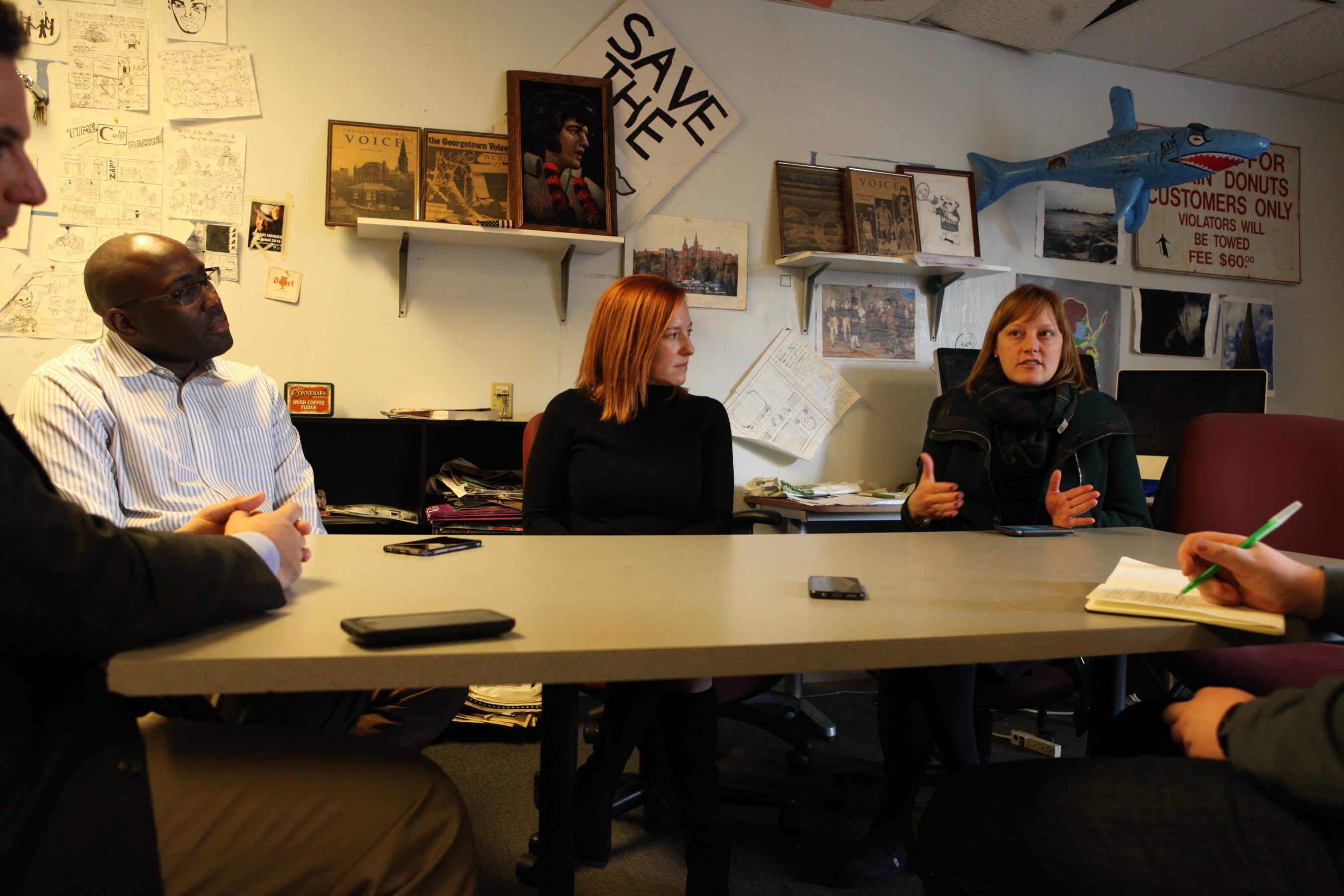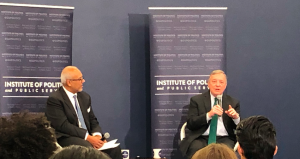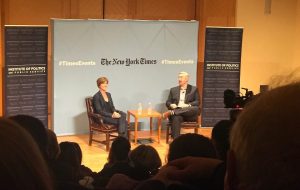The Georgetown University Institute of Politics and Public Service, part of the McCourt School of Public Policy, welcomed its new fellows to campus this semester. In the aftermath of the presidential election, the new fellows come from a variety of backgrounds, but all of them spoke about the importance of connecting with Georgetown students in the form of discussion groups. The Voice sat down with four of the five fellows to discuss the political climate and the upcoming semester.
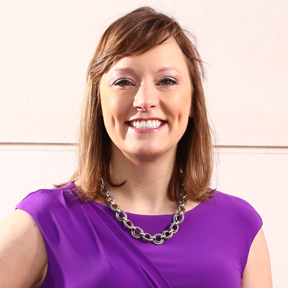

Photo: Georgetown University Institute of Politics and Public Service
Anna Palmer is a senior Washington correspondent and co-author of Politico’s “Playbook.” Her discussion group is called “Donald Trump’s Washington: Understanding the New World Order of Politics in Washington” and will discuss how Donald Trump has changed the traditional political order in Washington. It will look at the start of his presidency and how Congress is approaching his administration and the unsettling of traditional politics. It will also be very flexible depending on the latest news so it is difficult to predict exactly what will be discussed in the group.
“There is no better time to be in politics, to be in journalism covering politics, it is a fascinating time,” she said. “Whether you support Trump and you want to further his policies, or you don’t like what he represents and you want to get other people elected, being disaffected and sitting down and throwing your hands up isn’t the way to live your life. Now is the time to get active.”
She also said that the increase in the use of social media can help spread reliable information.


Photo: Georgetown University Institute of Politics and Public Service
Jen Psaki was the White House Communications Director under President Barack Obama. Her discussion group, “The Good, the Bad, and the Unknown: Communicating in a Social Media World,” will explore the use of social media during the 2016 presidential campaigns and the dangers of social media in the hands of terrorist organizations and hostile governments.
She urges students to follow their passions and get involved in organizations related to their interests. “Maybe it’s women’s’ issues, maybe it’s the environment, maybe it’s tax reform. Figure out what organizations work on that, figure out what candidates work on those issues,” she said. “Go do a campaign … that is the best way to see how the system works.”
For Psaki, while some media outlets have used new forms of media effectively, others have been reluctant to accept the fact that people have started to get their information in a different way. “Why is it that kids in their sweatpants in eastern Europe were able to put out fake news with a larger reach than some more traditional, decades-old newspapers in the United States?” she asked. “There’s a larger question there about how people get information and adjusting to that.”


Photo: Georgetown University Institute of Politics and Public Service
Grover Norquist is a conservative tax activist and the president of Americans for Tax Reform, an organization that advocates for the simplification of the tax code. His discussion group is entitled “The Changing Correlation of Forces in Politics in the United States.”
“My discussions will be built around how political coalitions come into being—how you grow them. How they interact,” he wrote in an email to the Voice.
He said that learning from students’ experience is key. “Do not assume those who have been doing this for decades have been doing it right, or that past successes ensure future success,” he wrote. “Sometimes the gray haired folks are just old.”
He also said that the 2016 election was just one election in a series of elections. “Trump is important because someone remembered to win the House and Senate in past elections.” he wrote.


Photo: Georgetown University Institute of Politics and Public Service
Marlon Marshall was the Director of State Campaigns and Political Engagement for Hillary Clinton’s presidential campaign. He also worked on launching the My Brother’s Keeper Community Challenge, which is an initiative from the Obama Administration working to improve the lives of youth, particularly young men of color.
He echoed Psaki’s sentiment that becoming involved in campaigns is the best way to learn about organizing. “We need more people getting involved in our political process right now,” he said.
The big question for Marshall is, how? He said that Trump’s use of Twitter is an example of the effectiveness of new forms of media. He pointed out that Politico was the leader in internet journalism when it was started. “What’s the next iteration of that in the next 10 or 15 years of where media is going?”
His discussion group will focus on organizing and social justice, and is titled “Organizing and Social Justice: The Role of Relationship-Focused Organizing in Social Change in the United States.”
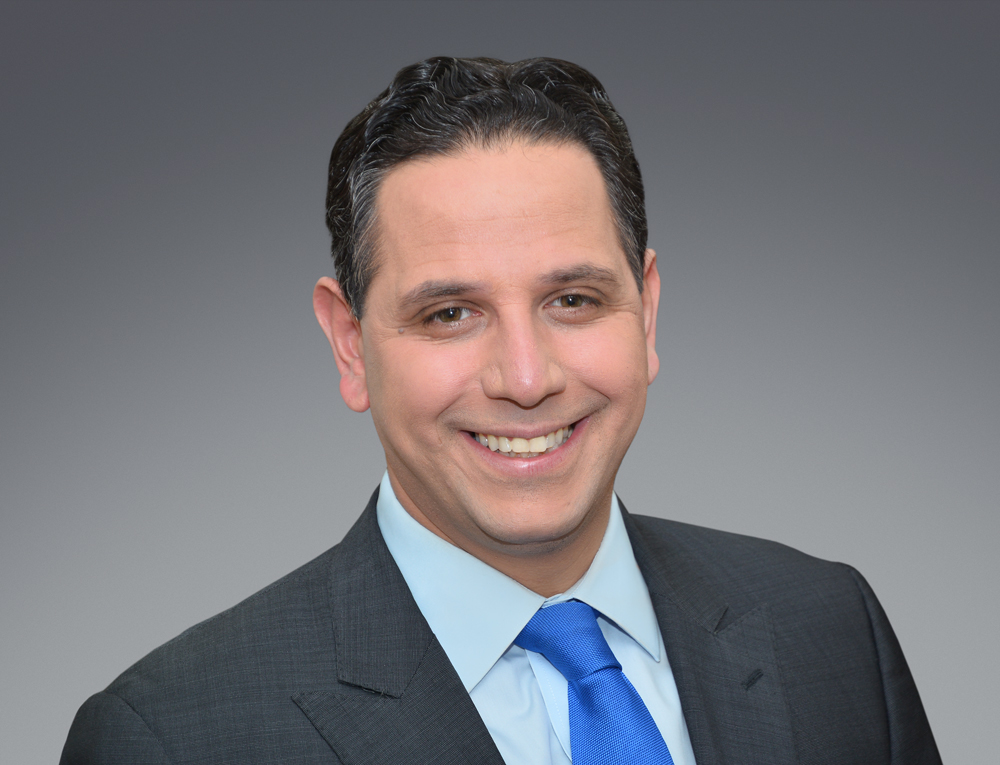

Photo: Georgetown University Institute of Politics and Public Service
Tony Sayegh is a Republican campaign strategist, Fox News contributor, and a former media consultant to the Trump/Pence campaign. His discussion group, “Has the 2016 Election Changed American Politics Forever? (Or At Least a Generation)” focuses on what changed in the political process with Trump’s election and the political realignment of various parts of the country.
“We’ve talked a lot about populism, we’ve talked a lot about certain parts of the country regionally now moving toward a Trump presidency while others seem to fixed on the Democratic side,” he said. “How real is this? How long-term is this?”
When asked about the future of media, Sayegh said that many news outlets began to use their editorial pages as activist journalism. “I wonder if that was temporary, if it was just heat of the moment stuff, or is this going to really alter the business models of some of these publications?”
Sayegh also said that this generation has a great opportunity because of the variety of ways to get involved. He said that with the advent of different types of media, smart, young people are needed. “The outcome of an election should never determine your enthusiasm to serve,” he said. “Your enthusiasm to serve should be a personal decision. This country exists because citizens exist in our governmental process.”


